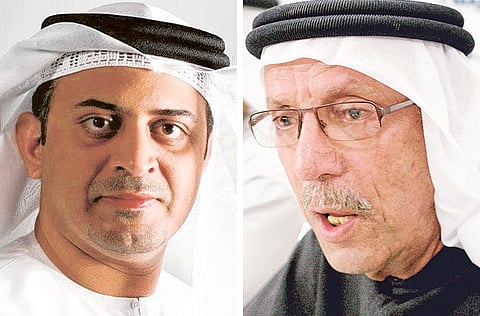New labour rules ensure greater productivity
Business leaders hail regulation and its positive effects

Dubai: Members of the business community and civil society have praised the UAE's new labour law that will ensure greater flexibility and productivity in the private sector.
Hani Al Hameli, Secretary-General of the Dubai Economic Council (DEC) said: "The new law will enhance labour flexibility and hence sustain economic growth.
"The new regulations are part of the ongoing reforms of the Ministry of Labour aimed at enhancing the business environment," he said.
The new rules permit a worker to move from one company to another. They also ensure the private sector has motivated and skilled workers, he said.
"Which means more flexibility and breaking the deadlock in the market towards an innovative and productive environment," he said.
He also added that such reforms in the labour market stemmed from the knowledge-based economy strategy adopted by the country. Al Hameli said that the new regulation is based on best practices worldwide.
Positive impact
Ahmad Al Matroushi, head of the Dubai Property Society, told Gulf News: "There is no doubt that the new labour rules and regulations will have a positive impact on the UAE workforce and employers simultaneously."
He remarked that the new resolution came at the right time as a good number of businesses in the UAE are undergoing restructuring and many businesses are more active than others.
"Therefore this move will grant workers more freedom to change employers and have better options. The labour market will benefit and be energised by the workforce available in the country," he said.
Al Matroushi added that the new rules would not be challenging for employers as there were a lot of conditions and restrictions that protected their rights.
When a worker felt free in the labour market, within a clear legal framework, he would be more productive, he said.
Abdul Gaffar Hussain, Chairman of the Emirates Human Rights Association, highly appreciated the government move.
He said: "The sponsorship system is not welcome in a developing country such as the UAE that needs to meet the international standards of the labour market and also human rights.
"The UAE has a civilised and open society and this step is a good sign that the country is intending to cancel the sponsorship system one day. It is a very optimistic start," he added.
"A majority of UAE businesses rely on the foreign workforce. So they have to get their full rights and also be responsible and avoid misusing the freedom they are granted."
Hamad Bu Amim, Director-General of the Dubai Chamber of Commerce and Industry, said: "Definitely we welcome the government's move towards more reforms of the labour laws which ultimately will have a positive result on the market."
Flexibility
"The UAE labour market is in need of such flexibility which allows employers in different sectors to get the benefit of qualified people available in the current market rather than importing foreign workforce."
Bu Amim said this in turn would reduce the cost of the workforce in the UAE and simplify labour procedures.
Paras Shahdadpuri, Chairman of the Indian Business and Professional Council, said: "I welcome the lifting of the six-month ban. This step will free the workforce and ease the recruitment process. The new regulations will provide mobility in the labour market."
Increase in costs
While the new rules meant workers could change employers after two years, however, Shahdapuri was completely unsatisfied.
He said: "This move will create a sort of chaos and instability in the labour market. Moreover, it's a waste of effort and increases costs for businesses.
"We need a minimum of three months to introduce our employees to the market and train them how to operate the business. So how can we let them move from one job to another after a short time?
"I do believe that the period which allow workers to change their employers should not be defined in the labour law, but it should be left to the parties' choice," he said.

